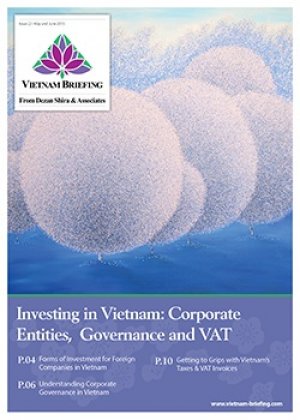Vietnam Market Watch: Auto Sales, Uber’s Success in Vietnam, and Vietnam’s Economic Growth
Vietnam’s auto sales fastest in region
Vietnam became the fastest growing automobile market in Southeast Asia this year with reported sales of close to 60 percent. The Vietnam Automobile Manufacturers’ Association stated that at least 215,520 vehicles which includes SUVs, passenger cars and commercial vehicles, were sold this year. This comes despite consumers having to pay more in tariffs and fees as compared to other countries. Analysts state that one reason for higher sales is easier loans for consumers, while truck sales have been boosted by stricter regulations on overloading.
Consumers who traditionally ride motorbikes are switching to passenger cars. Nearly US $6 billion was spent in importing cars, trucks and auto part,s up 59 percent from 2014. More than half of the vehicles sold were imported; India topped the list of automobile exporters, followed by China, South Korea and Thailand.
Vietnam becomes Uber’s second fastest growing market
 RELATED: Dezan Shira & Associates’ Corporate Establishment Services
RELATED: Dezan Shira & Associates’ Corporate Establishment Services
Uber on 16 December stated that Vietnam had become the second-fastest growing market after China since it began operations a year ago. Uber has provided more than 1.5 million rides in Hanoi and growth has surpassed major cities like London, Paris, San Francisco and Singapore. Uber is also working to meet the requirements set by the Ministry of Transport to operate legally. The transport ministry has stated that it needs to set up a branch in the country to operate, to which Uber has stated that it will comply with. Uber’s chief rival GrabTaxi is also operating in five cities in Vietnam and according to a leading poll commands 62 percent of the market followed by Uber.
Vietnam’s economy expands; trade deficit and labor productivity key challenges in 2016
According to data released by the General Statistics Office (GSO), the Vietnamese economy expanded by 6.68 percent in 2015. This was the fastest in five years and above the National Assembly target of 6.2 percent; contributory factors were macroeconomic stability, a 10-year low inflation, high confidence index and the positive growth of key industries.
Foreign Direct Investment (FDI) registered a year on year increase of 12.5 percent – US $22.76 billion were poured into existing and new projects. The number of new projects initiated were 2013 (a drop of 0.4 percent) with a total registered capital of US $15.58 billion, out of which FDI disbursement was US $14.5 billion (rising by 17.4 percent). 94,754 new businesses were established in 2015 – an increase of 26.6 percent, having a combined capital of US $26.7 billion (VND $601 trillion) – a 39.1 percent increase from 2014. Despite the global slowdown on commodities, Vietnam’s export value was US $162.4 billion (rising by 8.1 percent), while its import value was US $165.6 billion.
The GSO wants an economic growth of 6.7 percent in 2016 among other things. Key challenges in this regard will be the increasing trade deficit with China, the hike in the US Federal rate and a widening labor productivity gap with the rest of the ASEAN states. Additionally, the recently concluded Trans-Pacific Partnership (TPP) is expected to heighten the competition in both the external and domestic markets of ASEAN countries.
|
Asia Briefing Ltd. is a subsidiary of Dezan Shira & Associates. Dezan Shira is a specialist foreign direct investment practice, providing corporate establishment, business advisory, tax advisory and compliance, accounting, payroll, due diligence and financial review services to multinationals investing in China, Hong Kong, India, Vietnam, Singapore and the rest of ASEAN. For further information, please email vietnam@dezshira.com or visit www.dezshira.com. Stay up to date with the latest business and investment trends in Asia by subscribing to our complimentary update service featuring news, commentary and regulatory insight. |
Investing in Vietnam: Corporate Entities, Governance and VAT
 In this issue of Vietnam Briefing Magazine, we provide readers with an understanding of the impact of Vietnam’s new Laws on Enterprises and Investment. We begin by discussing the various forms of corporate entities which foreign investors may establish in Vietnam. We then explain the corporate governance framework under the new Law on Enterprises, before showing you how Vietnam’s VAT invoice system works in practice.
In this issue of Vietnam Briefing Magazine, we provide readers with an understanding of the impact of Vietnam’s new Laws on Enterprises and Investment. We begin by discussing the various forms of corporate entities which foreign investors may establish in Vietnam. We then explain the corporate governance framework under the new Law on Enterprises, before showing you how Vietnam’s VAT invoice system works in practice.
 Navigating the Vietnam Supply Chain
Navigating the Vietnam Supply Chain
In this edition of Vietnam Briefing, we discuss the advantages of the Vietnamese market over its regional competition and highlight where and how to implement successful investment projects. We examine tariff reduction schedules within the ACFTA and TPP, highlight considerations with regard to rules of origin, and outline the benefits of investing in Vietnam’s growing economic zones. Finally, we provide expert insight into the issues surrounding the creation of 100 percent Foreign Owned Enterprise in Vietnam.
 Tax, Accounting, and Audit in Vietnam 2014-2015
Tax, Accounting, and Audit in Vietnam 2014-2015
The first edition of Tax, Accounting, and Audit in Vietnam, published in 2014, offers a comprehensive overview of the major taxes foreign investors are likely to encounter when establishing or operating a business in Vietnam, as well as other tax-relevant obligations. This concise, detailed, yet pragmatic guide is ideal for CFOs, compliance officers and heads of accounting who need to be able to navigate the complex tax and accounting landscape in Vietnam.
- Previous Article An Update on the EU-Vietnam Free Trade Agreement Discussions
- Next Article Vietnam – Latin America Trade: Complementary Economies under the TPP

































